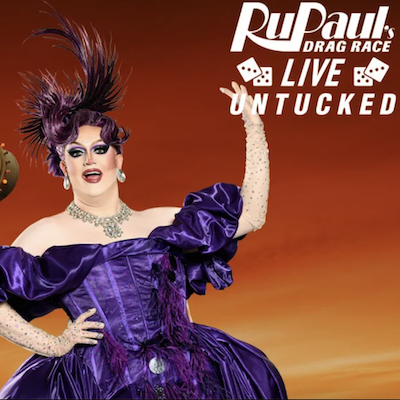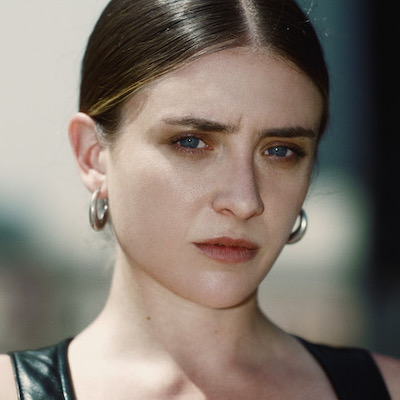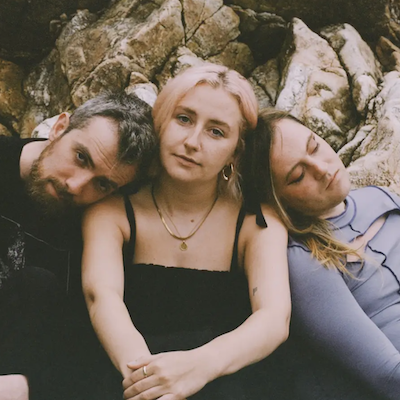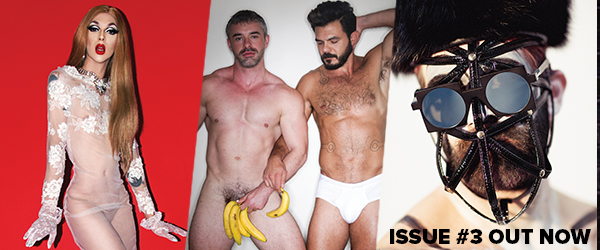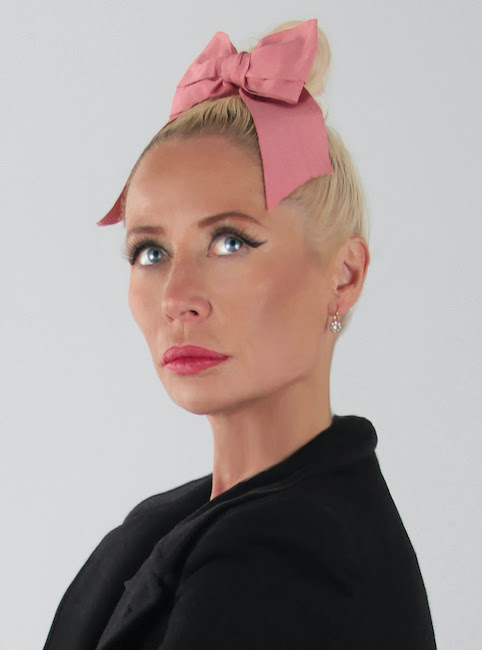
Even though the video for “(I Just Wanna) B With U” by Transvision Vamp was six years old by the time I saw it on MTV during my college years, Wendy James’ striking presence created a mini ‘youthquake’ among my friends and me in Ohio in the ’90s. Wendy is cool and dangerous—a figure who blurred the lines between punk and pop, drawing from the raw energy of The Stooges and UK pop while channeling something entirely new. As the only American writer for Loverboy, I missed the fan mania she caused in the late ’80s with Transvision Vamp’s 10 UK chart hits, but the impact of her music and attitude hit us just as hard years later.
Since the release of Racine 1 in 2004, Wendy has reinvented herself as a prolific solo artist collaborating with celebrated musicians like Lenny Kaye (Patti Smith Group), Glen Matlock (Sex Pistols), and James Sclavunos (Sonic Youth). Now, with her 10th solo album, The Shape of History, Wendy James continues to build on her musical legacy, featuring some of her most beautiful and varied material, from the gorgeous single “Everything Is Magic” to the spiky garage anthem “Step Aside Roadkill.”
The Shape of History is your 10th album! You recently posted a list of your discography, from your multiple solo albums in the 21st century, to the 1993 album Now Ain’t the Time for Your Tears (which featured songs written by Elvis Costello), all the way back to your time with Transvision Vamp (1986-1992). Were you referencing your past when you started this album?
I don’t think particularly I was referencing past music any more than I always do, which is ever expanding, but the roots of my inspiration are downtown mid-‘70s New York, No Wave, CBGB, Max’s Kansas City. It’s clearly a 10th album, so I suppose it reflects just having made it through 10 albums over 35 years. Not certainly verbatim, but not having compromised the music; having given all of the content—lyrical, artwork, music, collaborative work with all my musicians—everything I possibly could. Somehow, I’m still sane, relatively healthy, and haven’t turned into a loon. And the wisdom that comes with age, I suppose, is that one can be slightly grateful for the whole journey—imparting that “don’t sweat the small stuff” kind of thing.
In the title track from The Shape of History, you say, “It’s gonna be fun from now on!” It feels like you’re giving us advice, something to look forward to.
Yeah, in some of these songs, it’s like I’m talking to a younger version of myself—or really to anyone younger. When you’re a teenager and something goes wrong, you think it’s the end of everything. But of course, it’s not. That silly adage, “one door closes, another one opens,” is true. You realize as you get older that setbacks aren’t the end of the world. Some of this album is about saying to someone earlier in their journey, “It’s going to be okay. You’ll get through today, and tomorrow is another chance to begin again.”
Musically, there’s a sense of optimism. There are major 7th chords, beautiful harmonies… it feels like new colors are being added to the palette of Wendy James.
Well, my opening number, “Sweet Like Love,” is my Gershwin overture to my movie. Even though I don’t have the full orchestra, I wrote it very much in the style of a show tune, like on Broadway, whether it’s How to Be a Millionaire with Marilyn Monroe Or, Rhapsody in Blue, Woody Allen’s (view of) Manhattan. I wanted the album to open like an overture to a film—even though it’s still inherently an electric guitar rock and roll song.
There’s also a bit of a Laurel Canyon vibe, like California in the mid-’70s.
Yeah, mid-album, I go into that kind of California mid-’70s, with hair blowing in the wind, Tuesday Weld in Play It As it Lays. Maybe not necessarily Laurel Canyon, but that feeling is there.
Quite differently, you also have songs like your first single, “Freedomsville,” which, even though it’s analog, has a markedly electronic music influence.
Totally. That goes back to the beginnings of Transvision Vamp, when Blade Runner blew our minds. The Vangelis soundtrack, Ridley Scott’s direction—everything. The idea that you might be able to go into a phone booth and see the person you were talking to. Now we all have WhatsApp and it’s just normal but that futuristic vision shaped the sequencer sounds of Transvision Vamp and bands like Sigue Sigue Sputnik. I occasionally hear Transvision Vamp on YouTube, and the sequences are still really powerful.
Speaking of Blade Runner, it felt like Transvision Vamp and Sigue Sigue Sputnik, or even Frankie Goes to Hollywood, earlier in the pop timeline, were all commenting on a looming dystopian future.
Was it dystopian? Is Blade Runner dystopian?
Well, maybe that’s my interpretation.
For me, we interpreted it as this exciting new world filled with technology. I mean, you and I, if we come back in 20 years and look at this interview, our minds won’t even believe what’s been invented by then. At the same time, the LinnDrum had been invented— with the kick drum, he could trigger sequences that allowed us to have all these MIDI sounds on stage, which gave us the ability to incorporate orchestral elements. Do you remember Frankie’s orchestral stabs?
Yes, of course. They ended up in everything for years.
We knew something was going to happen. It just hadn’t been invented yet. I have this theory that the more we invent present and future technologies, the more they resemble the sci-fi of our age group. whether it’s WhatsApp on your phone or Elon Musk and all that he’s doing. You can only invent something like an Apple Mac if it’s based on what’s in your brain. And I wouldn’t want to be in Elon Musk’s brain—God! [laughter]
When you began with Transvision Vamp and started interacting with people like members of The Clash, how much did punk influence you at that time? Did you consider what you were doing as punk?
Well, I’m about 12 years behind them. I was 10 when “God Save the Queen” went to number one but was blacked out (by The BBC). Yes, it’s true that I did start hanging out with those guys as a mid-teenager. I loved the music, of course, but my real sweet spot was what was going on at CBGB and pre-CBGB. Aside from the wonderful filth of British punk rock, which really went up against a very straight-laced society—strikes, Margaret Thatcher, and nothing for anyone—at the same time you had huge rock bands doing stadium tours. You know all about British punk, but hanging out with those guys was like a daily wash of learning. You grew up with the attitude of “fuck you and fuck them,” which is really useful because the music business will eat you up and spit you out at every opportunity.
You’ve had such a varied career, from the pop of Transvision Vamp to the Elvis Costello album, and then your solo work—first as Racine, and now under your own name with a band of notable musicians. I imagine each was a very different experience.
Well, my life worked out in a way where I was incredibly successful and wealthy at a young age. But instead of things continuing to go up, they went down, in terms of being dropped by Universal and eventually running out of money. I spent it. Some people invest, and that’s the right choice to make, but I didn’t. So, life conspired to teach me how to become industrious with my music. A major crossroads came after I made the Elvis Costello record. Some people love it, but what that album did for me was make it clear that if I wanted to continue making music seriously, I had to write all my own material. I had sung Elvis’s words, and before that, Nick Sayer’s words. This was the turning point for me. But it also coincided with no longer having a major label behind me. So, you go back to basics. You find musicians who share your musical tastes, and you start again. But you start like the penniless musician you never were. [chuckles]
Gradually, over the course of these independent albums, things have improved. But when you don’t have CBS throwing 10 million pounds at you, the trajectory is slower. Still, I’ll leave behind a legacy of work that, even without a million pounds backing me, is as good as it can possibly be.
I think of New York City as being your second chapter.
Oh, totally. My happy place. I left everything behind in London, condensed my life into one suitcase, and got a one-way ticket to Manhattan. Just like Patti Smith took the Greyhound, I caught the BA flight, but it was the same journey. It was the best decision I ever made. I lived there for 15 or 16 years, and even on the bad days, I was happy. That city fucking feeds you.
Which is the spirit of DIY. I remember an old episode of Diners with gay icon Pete Burns from Dead or Alive, where he talked in detail on how much he admired you. From a larger perspective, why do you think people from the queer community identify with you?
I’ve seen that! Brilliant. I would see Pete, because he lived in West London, and if I was walking up to Notting Hill Gate, he’d just say a very demure hello. I had no idea he thought those things about me—he was such a tough Liverpudlian too! When he said I should have been more successful, I just thought, “Wow, I wish we’d sat down and had a chat.” A great guy. I’m not sure why I have a queer following, but back in the day—and perhaps even now—I suppose I had some advantageous looks that appeal. I’m not fully in the Kylie or Madonna mold; because how I see it they are showgirls. There’s also a grimy rock-and-roll side to me. One of the appealing things about me perhaps was my attitude, which I wouldn’t call diva-esque, but it can get quite strong. I don’t know. You tell me. But I’ve been blessed with that following.
In the new song ‘Step Aside Roadkill’ I found the line poignant: “People say you’ve got to be from somewhere. I say, I guess.”
Well, it comes from the truth. I’m an adopted person, so as much as I can tell you my basic English history about growing up and going to school, I don’t necessarily identify that as where I come from. My story is unknown to me. I don’t know my birth parents. I left home on my 16th birthday. Of course, I was taught how to read and write and arithmetic and I had some music lessons and for all of that, I’m grateful. But to a larger extent, whoever I am I feel as though it’s been self-created. Because I couldn’t relate it back to grandparents or cousins that were mad violinists or something, or dropouts or writers. I just don’t know who, where or what I come from. So that’s literally what that sentence says. That can be the same, I’m sure, for anyone that even grows up with their birth family, you can feel like “Who the fuck are these people?” And conversely, for many adopted people, they think their adoptive parents is the fucking parents’ love of their life. But because whether it’s the way I am or my adoptive parents, there was just a bit missing, you know.
Do you think that’s sort of what made you want to be an artist in some ways?
No, that was in me. I was singing in the school choir, learning violin from the minute I could do anything. I was musical, that was it. I wanted to perform from the very beginning. I was singing into hairbrushes, I really was! That was just who I was gonna end up being wherever I was.
Can you tell us about the live shows that are to come?
Well, America’s to come. I’m doing a tour of best indie record stores around the UK; centered around Rough Trade. And they’re all set up for in-stores. Because it’s my 10th album, I will throw it open to the audience to ask whatever funny, silly, brilliant questions they may have. And play the Shape of History songs, and a selection of my previous work, as I always do in all my gigs anyway. There’s much to do, but I’m so lucky to still have the opportunity to do it. I’m genuinely excited to hear what my followers think about this album.
I think it’s exciting. I think Wendy that ‘Everything Is Magic’ is one of the most beautiful songs you’ve ever written.
Yeah, thank you. Me too. And you can still rely on me every album to turn out a couple of garage pop numbers.
Yes! Like ‘Step Aside Roadkill’ which is a great one. So, I have quite an unusual last question.
All right, make me.
Loverboy Magazine is named after ‘Loverboy’, the hit song by Mariah Carey. Is there any moment of Mariah Carey’s career or songs that intrigue you?
Well, I’ll tell you something I know about Mariah Carey, which certainly may not be true. A friend who worked for Marc Jacobs and loved Mariah swore to me that Mariah used a body double and he would just Photoshop her head on. Is that true?
Ha! I have no idea. Micheal the Editor-in-Chief will know! I confess I don’t know much trivia about Mariah Carey.
I only really know her from that Christmas song. Oh, no, that’s not the only thing I know! She’s in that fucking brilliant movie about the three girls that take down the mob? WiseGirls. Recommend that to your readers. Your editor must surely know about it. I rewatched it just a year ago. Mariah is so good; she’s a really good actress. Watch WiseGirls, George. It’s fucking great.
Pre-Order the Shape of History on CD and Vinyl
Photo: David Leigh Dodd Interview by George Alley



